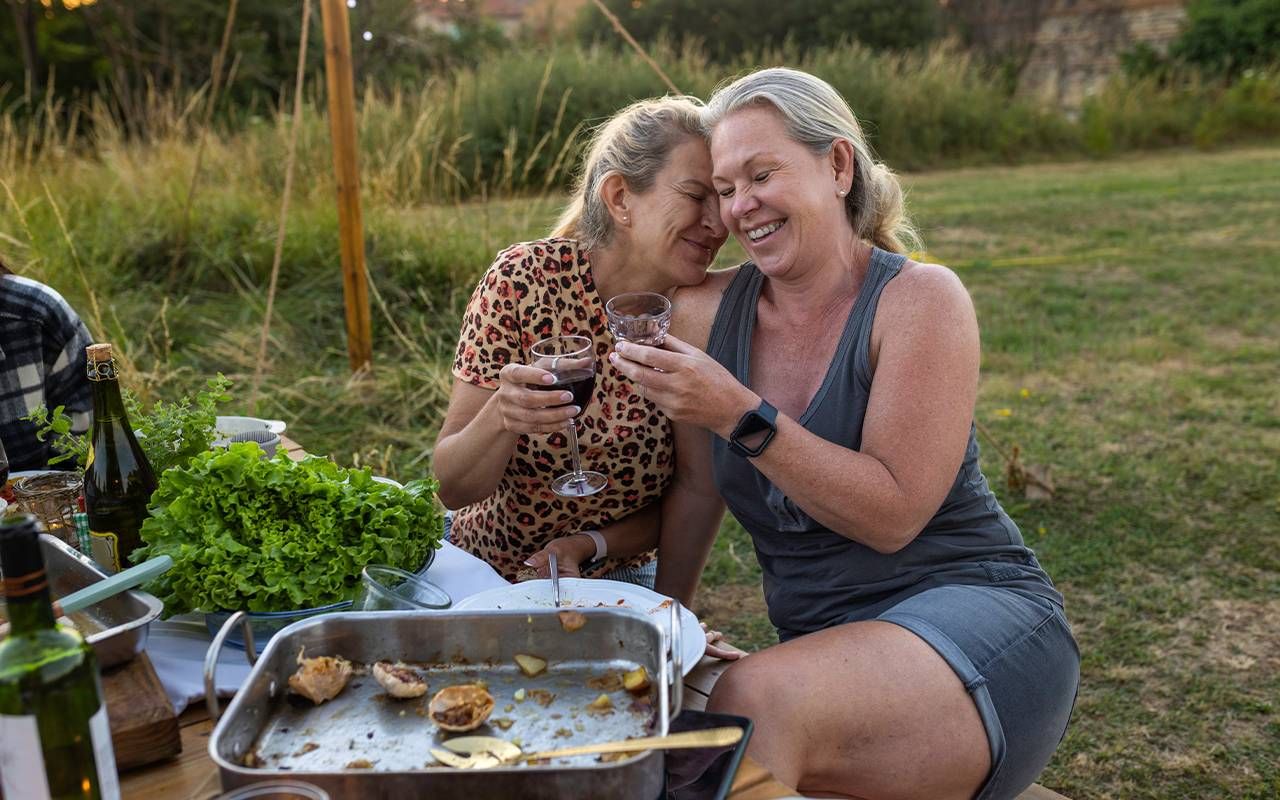Conversations With Friends of a Certain Age
Once, we talked about boys and go-go boots. Now, we talk about dental implants and date nights in long marriages.
Just yesterday, it seems, we were 16, talking about sex all the time — what it feels like to tongue-kiss a guy (great with a good kisser, like slurping oatmeal with a bad one), how to know when you're ready to "lose your virginity" and how not to get pregnant. We groaned in horror when my friend Susan told us that her father had condoms in his bedside table and laughed a bit uneasily when someone asked if you were supposed to swallow the birth control pill or put it you-know-where.

We talked about fashion — go-go boots, fishnet stockings, Twiggy-like baby doll dresses and puffy-sleeved peasant blouses. My friend Bonnie Schacter, now Barchichat, who lives in Redondo Beach, California, and I used to go shopping at "big Macy's," formerly the world's largest department store.
When you've reached a certain age, you know a lot of dead people and you wake up most days happy that you're not one of them.
Bonnie and I would go all the way to the top floor just to ride the ancient rickety escalator with wooden steps. We'd eat lunch at Tad's, a now-defunct steakhouse where, for under $5.00, we'd each get a charbroiled steak, a baked potato and Texas toast dripping with butter. Mouths full, we'd talk about the meaning of life, why we were put on this earth and was there really a God.
Fiber Capsules and Brain Games
And now. We still talk about the meaning of life, but more often we talk about death. When you've reached a certain age, you know a lot of dead people and you wake up most days happy that you're not one of them. We chat about things like death cafes (where people get together and discuss thanatopia — their fear of dying — while munching on no-salt potato chips washed down with a good craft beer) and green funerals and composting, and why would you even get buried in a cemetery when the kids hardly come to visit you when you're alive.
We talk about fiber capsules versus powders, about playing brain games like Spelling Bee to stay sharp and how terrifying it is when you get a callback after a mammogram (even though, in the vast majority of cases, it turns out to be a big nothing.)
We talk about moving our older parents who live in other states closer to our homes so we can be nearby if they need us.
Thirty or forty-some years ago, we talked about our wonderful OBs who wore huge smiles as they placed our squalling newborns into our arms. Now, all these years later, our medical conversations range from $4000 dental implants to endlessly debating the pros and cons of straight Medicare versus Advantage Plans, and ways to find a new chiropractor when our old one moves to Santa Fe to become a yogi.
We talk about moving our older parents who live in other states closer to our homes so we can be nearby if they need us. My mother, who lived alone until she died at 96, never allowed herself to be "moved" anywhere. She had a fit when I tried to take her elbow crossing the street — "I'm not disabled, I'm just old," she had yelled once — and she had no interest in "being brought back to NYC."
Bringing My Mother Back to New York
Even in her early 90s, my mother was perfectly happy living in Florida, going to the mall with "the girls," browsing through the shops, and then eating her beloved meatball subs on crusty bread. Some of the "girls" had ill-fitting dentures and had soup for lunch, telling my mom how lucky she was. My mother usually offered them a bite but no one ever took her up on it.
I make everyone laugh telling them about how I finally got my mother back to New York. After her death and cremation, she (or rather her ashes) sat in a cardboard box nestled in a Publix supermarket green bag. I was going through security before boarding a flight home from Florida and had to explain to the airport security person what was in the bag.
Stammering and sputtering, I finally said, "It's my mother. My mother is in there." Not knowing what to say, the flummoxed attendant let me, and my green bag, and my mother, onto the plane. It was the first and only time my mother flew without worrying about dying in a plane crash.
When we're done with gruesome, we discuss things that make us smarter or make us laugh. My friend Evelyn Bennett, of Kew Gardens, New York, and I recently talked about her "grand-dog" who's a blood donor. (There is such a thing as doggie blood transfusions. Google it.)
Another week, my friend Susan of Fair Lawn, New Jersey, and I talk about married date nights, the kind you have when you've been married for 30 or 35 years. (Don't ask.) They may involve flannel pajamas.
The 'Magic' of Married Date Nights
In my neck of the woods, date nights entail dimming the lights (although with our ripening cataracts they're dim enough already) and settling down with a good bottle of wine and crackers dotted with gourmet, sometimes smelly cheese — Stilton or Roquefort are favorites. We might watch a movie. The date part is that we sit on the couch together (without the cats wedged between us) and every once in a while, one of us will absently stroke a thigh or kiss the top of our spouse's head.
The date part is that we sit on the couch together (without the cats wedged between us) and every once in a while, one of us will absently stroke a thigh or kiss the top of our spouse's head.
We go to bed around eleven, put in our matching night guards, and give each other chaste good night smooches (It's impossible to have deep, passionate kisses with those things in your mouth, even if you wanted to.) Most likely, after murmuring what a "nice date night" it's been, we're asleep by 11:15.
Some of us probably are having sex on date nights, but we don't talk about it. If we did, it might be a very short conversation. One of my friends who's been happily married for more than forty years says that geriatric sex is an oxymoron. I'm not sure what that word even means, but there can't be something particularly good about anything that contains the syllables moron and sex in the same sentence.
And eventually and inevitably we talk about gratitude. Our arthritic knees may ache but they still allow us to bowl or swim or even, as my friend and her now over 80-year-old husband did, to climb — slowly, cautiously, but ecstatically — to the top of Machu Picchu. We talk about being grateful that we can have an extravagant lunch with lobster salad, a good glass of Sancerre and a gorgeous but pricey dessert without having to worry about paying the monthly mortgage bill.
We're happy that our children text us, pretty often actually, even if we have to remind them that we still have a phone (a landline, too, if anyone remembers what that is) and that an occasional phone call would be a welcome interruption, even on date night.
Not that they know about that — they would be horrified beyond belief to think that their "elderly" parents engage in anything except reading the newspaper, sipping their chamomile tea and watching their financial portfolios burn and crash while eating up the children's eventual inheritances.
Expressing Our Gratitude
We're grateful that we've lived long enough that we can now freely use expressions like "in my day" or "nothing is the way it used to be" or "I don't know what's with the young people these days."
We have lived and loved and lost and loved some more, and that gives us plenty to talk about.
We're thankful we have pointy tweezers to pluck out the unwelcome gray hairs that proliferate under our chins, and that our (slightly) arthritic fingers are still nimble enough to use said tweezers effectively.
We feel appreciative of the fact that our neighbor told us about gummies and that we now sleep better than we ever have before. Of course, you have to make sure you take your gummie before you brush your teeth and put your night guard in.
We feel immense gratitude for having survived the pandemic, being able to attend our 50th high school reunion (held two years late, but what a blast it was) and actually getting to dress up for the first time in three years. I wore my size 16 "little black dress" (talk about oxymorons!) and tottered around in heels, feeling happy, attractive and so glad to be alive.
I, personally, feel so lucky to have met the man I married when I was on the cusp of turning forty. After thirty-one years of marriage, he still says "I love you" every night when we go to bed, and I know he means it. It doesn't get any better than that.
So yes, our conversations are different than when we were young and innocent. They're more depressing at times, but they're also more nuanced. We have lived and loved and lost and loved some more, and that gives us plenty to talk about. And so, so much to be grateful for.


